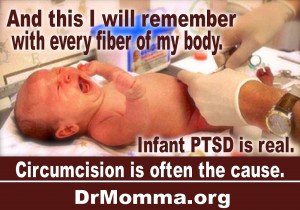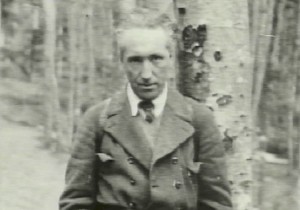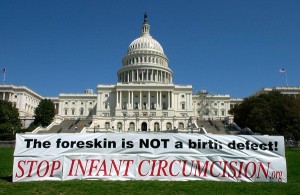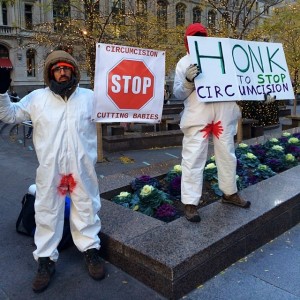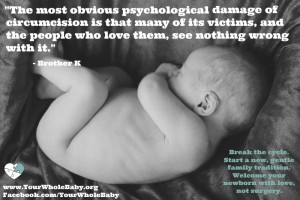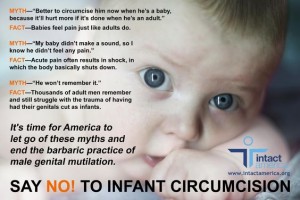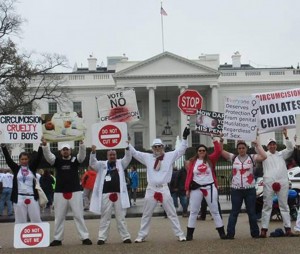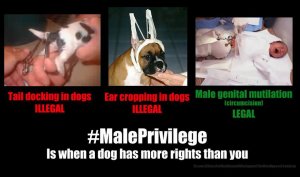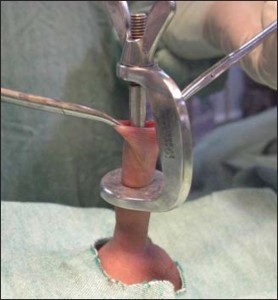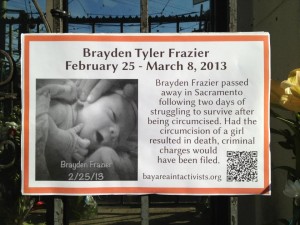Psychological implications of circumcision
 Because circumcision affects so many men, there’s bound to be a multitude of reactions and responses by individuals who have been circumcised without their consent. It’s common for many men to just brush it off as something that happened to them which was beyond their control, and their way of dealing with this is to just get on with their lives. That’s one way of coping with it and it’s probably a reasonably good way of dealing with the issue. There are others who take a defensive stance about their circumcision and become pro-circumcision and anti-foreskin as a way of coping with it. These are the men who want to perpetuate circumcision (the circumcisionists) and treat the foreskin with derision and can be hostile to intact men for possessing a foreskin. This seems to be an internalised form of anger about being circumcised, which unfortunately continues the cycle of circumsicion. Whilst others still, feel violated about having had their foreskin taken from them without any say in the matter and are resentful about having had this done to them. Many of these men are prone to a number of issues which are mentioned later and many of whom are desiring to restore or actively in the process of restoring their foreskins.
Because circumcision affects so many men, there’s bound to be a multitude of reactions and responses by individuals who have been circumcised without their consent. It’s common for many men to just brush it off as something that happened to them which was beyond their control, and their way of dealing with this is to just get on with their lives. That’s one way of coping with it and it’s probably a reasonably good way of dealing with the issue. There are others who take a defensive stance about their circumcision and become pro-circumcision and anti-foreskin as a way of coping with it. These are the men who want to perpetuate circumcision (the circumcisionists) and treat the foreskin with derision and can be hostile to intact men for possessing a foreskin. This seems to be an internalised form of anger about being circumcised, which unfortunately continues the cycle of circumsicion. Whilst others still, feel violated about having had their foreskin taken from them without any say in the matter and are resentful about having had this done to them. Many of these men are prone to a number of issues which are mentioned later and many of whom are desiring to restore or actively in the process of restoring their foreskins.
The psychological damage caused to neonates and pre-pubescent boys has been researched and documented only relatively recently. The message given to new born boys upon being traumatised by circumcision is that “you have just arrived in a very hostile place because they are amputating the most sensitive part of your body”. Additionally the information conveyed is that “your sex centre is not respected because this society is desensitising your penis and that your rights as a person are not respected nor valued”. In ‘Wounds that Time won’t Heal: The Neurobiology of Child Abuse’ by Dr. Martin Teicher, it was found that inflicting physical abuse on babies, “sets off a ripple of hormonal changes that wire the child’s brain to cope with a malevolent world.” Males are violent due to circumcision. It is usually boys who go to school and kill people; they are violent since their brains are wired for violence from infancy. Rarely does a girl take a gun to class and kill people. The anger expressed by one individual found on the sexually mutilated child website is encapsulated in the following…..“I wish I could circumcise every uncircumcised man in the world, so they’d all be like me. I don’t have a foreskin and no one else should have one either.”
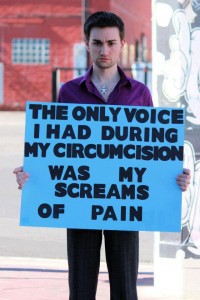
Many adult men are now speaking out about the resentment they feel from having their foreskins cut off as babies
The paralyzing horror and crushing humiliation that some children feel and then secretly live with when they realize that part of their penis has been cut off, leads them into adulthood as being victims of this practice but are often silenced by the humiliation. They would rather have their foreskins intact but cannot face the added shame of calling attention to the fact that part of their penis has been cut off. They often think they are alone, and pretend contentment or indifference to save face, unaware that there are other circumcised men who have the same feelings and are pretending too. Because they keep their thoughts and feelings to themselves, they are easy to be unaware of and easy to ignore. In his book ‘Fire in the Belly: on being a man’, Sam Keen states “The implicit message … is that your body henceforth belongs to the tribe and not merely to yourself…. That so primitive and brutal a rite continues to be practiced nearly automatically in modern times when most medical evidence indicates that it is unnecessary, painful, and dangerous suggests that circumcision remains a mythic act whose real significance is stubbornly buried in the unconscious. That men and women who supposedly love their sons refuse to examine and stop this barbaric practice strongly suggests that something powerfully strange is going on here that is obscured by a conspiracy of silence.”
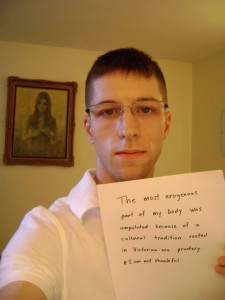 The apparent contentment of men with their circumcised state is often an illusion. Many circumcised men live with two secret fears: that they are sexually impaired and that they will be exposed as sexually impaired. As they become aware of the facts about the foreskin and circumcision, their fear that they are impaired is confirmed. As they realize that others are becoming aware of the same facts, their fear that they will be exposed as impaired comes true. The result is often a paralyzing mixture of feelings few men would care to acknowledge: shock, humiliation, anxiety, frustration, anguish, bitterness, resentment, rage, depression, despair, and envy of males whose foreskins are intact. It’s not that men prefer to be circumcised, it’s just that once they are, they often keep their real thoughts and feelings about it to themselves and pretend contentment or indifference in an attempt to make the best of it. Hundreds of millions of circumcised men were never given a choice about keeping their foreskins.
The apparent contentment of men with their circumcised state is often an illusion. Many circumcised men live with two secret fears: that they are sexually impaired and that they will be exposed as sexually impaired. As they become aware of the facts about the foreskin and circumcision, their fear that they are impaired is confirmed. As they realize that others are becoming aware of the same facts, their fear that they will be exposed as impaired comes true. The result is often a paralyzing mixture of feelings few men would care to acknowledge: shock, humiliation, anxiety, frustration, anguish, bitterness, resentment, rage, depression, despair, and envy of males whose foreskins are intact. It’s not that men prefer to be circumcised, it’s just that once they are, they often keep their real thoughts and feelings about it to themselves and pretend contentment or indifference in an attempt to make the best of it. Hundreds of millions of circumcised men were never given a choice about keeping their foreskins.

Some men who have been circumcised can experience feelings such as humiliation, anxiety, frustration, bitterness, resentment, rage, depression, despair, and envy of males whose foreskins are intact
In a report of adult clinical cases Rhinehart (1999) concluded that a man circumcised as a child is more likely to react with terror, rage and / or dissociation when confronted with situations interpreted as threatening. As in any situation of post-traumatic stress, an event resembling any aspect of the original traumatic experience is more likely to provoke negative emotions such as panic, rage, violence, or dissociation. It is therefore not surprising that PTSD may result from childhood circumcision, just as it does from childhood sexual abuse and rape. Several researchers have concluded that PTSD may result from circumcision and / or from circumcision related condition in later life. For example, Rhinehart (1999) reported finding PTSD in middle aged men who had been subjected to infant circumcision. “Many men who were circumcised as neonates consider it a nonissue because they cannot remember anything about it. In my psychotherapeutic work with men, however, it is clear that the memory is there. Since the event occurred at a very early preverbal level, it is most often experienced as a body or somatic memory rather than as a more familiar verbal memory. Various disturbing mental images and intense feelings often accompany the reemergence of this body memory, including the feel of sharp metallic instruments cutting into one’s flesh … the sense of being overpowered by big people, being alone and helpless, feelings of terror, and a sense of paralysis and immobilization.” Circumcision involves an imbalance of power between perpetrator and victim, contains both aggressive and libidinal elements, and threatens a child’s sexual integrity by amputating part of the genitalia. Rhinehart states that the long-term psychological effects of circumcision include:
- a sense of personal powerlessness
- fears of being overpowered and victimized by others
- lack of trust in others and life
- a sense of vulnerability to violent attack by others
- guardedness in relationships
- reluctance to be in relationships with women
- defensiveness
- diminished sense of maleness
- low self-esteem
- shame about not “measuring up”
- anger and violence toward women
- irrational rage reactions
- addictions and dependencies
- difficulties in establishing intimate relationships
- emotional numbing
- need for more intensity in sexual experience.
- sexual callousness
- decreased tenderness in intimacy
- decreased ability to communicate
- feelings of not being understood
Some men circumcised in infancy or childhood without their consent have described their present feelings in the language of violation, torture, mutilation, and sexual assault. Psychiatrists have long been in agreement that circumcision is basically a punitive act.
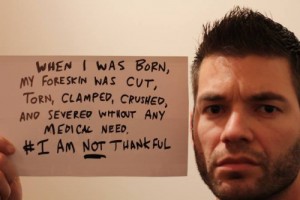 Even if the psychological condition of circumcision do not combine into a formal diagnosis of PTSD, it is possible that there may be long lasting effects on a man’s life, particularly in psychologically sensitive individuals with other factors or issues in their lives. Presumably responding to their current interpretation and feelings, many circumcised men who have recognised the loss of a highly erogenous, irreplaceable part of their penis have reported long lasting emotional suffering grief, anxiety, and depression, and sense of personal vulnerability. Avoidance or obsessive preoccupation with such a loss, along with anger, can be difficult to reconcile for some men depending on their particular personality. Emotional numbing, avoidance of the topic of circumcision, and anger are potential long term psychological consequences of the circumcision trauma. Circumcised men and boys are 60% more likely to suffer from alexithymia, a psychological trait disorder which causes difficulty in identifying and expressing one’s emotions, which can lead to difficulties in sustaining relationships. In extreme cases, there might be aggressive, violent, and / or suicidal behaviour.
Even if the psychological condition of circumcision do not combine into a formal diagnosis of PTSD, it is possible that there may be long lasting effects on a man’s life, particularly in psychologically sensitive individuals with other factors or issues in their lives. Presumably responding to their current interpretation and feelings, many circumcised men who have recognised the loss of a highly erogenous, irreplaceable part of their penis have reported long lasting emotional suffering grief, anxiety, and depression, and sense of personal vulnerability. Avoidance or obsessive preoccupation with such a loss, along with anger, can be difficult to reconcile for some men depending on their particular personality. Emotional numbing, avoidance of the topic of circumcision, and anger are potential long term psychological consequences of the circumcision trauma. Circumcised men and boys are 60% more likely to suffer from alexithymia, a psychological trait disorder which causes difficulty in identifying and expressing one’s emotions, which can lead to difficulties in sustaining relationships. In extreme cases, there might be aggressive, violent, and / or suicidal behaviour.
The views of other circumcised men from the sexually mutilated child website further express the hurt and resentment that can run so deeply and the following comments are indicative of this: “They [those who want all males circumcised] suffer from “foreskin envy”…“Has anyone done a study on circumcisers? What kind of person trains himself (or herself) and manoeuvres himself (or herself) into a position where he (or she) can get paid to cut healthy erotogenic tissue, living flesh from the genitals of unwilling, unconsenting children and babies or, for that matter, from willing, consenting adults?”…“most men who circumcise babies, like most men who want babies circumcised, were themselves circumcised as babies, and therefore have no way of knowing how a foreskin feels, what it’s like to have one, how the absence of a foreskin has affected their lives, or how it affects the lives of the babies they circumcise.”…“If the only way a male can be made to part with his foreskin is to cut it off by force, what does that say about those who commit such an act? What does that say about societies that tolerate it? What does that say about institutions that sanctify it?”… …“one of the most common, most destructive types of all sex abuse crimes are by men who, behind the mask of medicine or religion, try to make their own lack of a foreskin seem normal by cutting off the foreskins of children and babies.”
The following is a direct quote from circumcision.org about why circumcised men are generally silent about being circumcised: [“Why don’t we hear a lot more from circumcised men about how they truly feel about being circumcised? Here are the possible reasons.
- Circumcised men do not know what they are missing. They believe that the sexual sensitivity they have without a foreskin is “normal.” (Similarly, a woman born in Somalia who had been subjected to a severe form of female circumcision insisted that it had no impact. “It’s the same thing. There is nothing different about my sexuality.”) According to one man who was circumcised as an adult, sex without a foreskin is like sight without color. Those who have not seen in color cannot appreciate what is lost.
- Young circumcised men may not notice the negative sexual effects of circumcision until they are older, because of the progressive desensitization of the exposed glans (head of the penis) from exposure and rubbing against clothes. It is possible that circumcision is an unrecognized factor in the high rates of impotence in older American men.
- Accepting circumcision beliefs and cultural assumptions prevents men from recognizing and feeling their dissatisfaction. A typical response is “When I was young I was told it was necessary for health reasons. I guess I just didn’t question that. I assumed that was so.”
- The emotions connected with circumcision that may surface are very painful. Repressing them protects men from this pain. A circumcised man recalled, “It was something I just didn’t examine. I put it away in the back of my mind like a lot of guys do.” If the feelings do become conscious, they can still be suppressed. After learning about circumcision, another man said, “I don’t want to be angry about this.”
- Those who have feelings about their circumcision are generally afraid to express them because their feelings may be dismissed or ridiculed. When asked why he had not revealed his circumcision feelings before, one man said, “I would be looked upon as strange or else people would toss it off lightly.” Another said, “It’s not something that anyone talks about. If it is talked about, it’s in a snickering, comical way which I find disturbing. People laugh about it as if there is something funny going on.”
- Verbal expression of feelings requires conscious awareness. Because early traumas are generally unconscious, associated feelings are expressed nonverbally through behavioral, emotional, and physiological forms. Attitudes about people, life, and the future may also be affected. An example of an attitude resulting from childhood trauma is “You can’t count on anything or anyone to protect you.”
Lack of awareness and understanding of circumcision, emotional repression, fear of disclosure, and nonverbal expression help keep circumcision feelings a secret.”]
Research by Ramos and Boyle (2000) involved 1072 pre-adolescent and adolescent Philippino boys who were circumcised in a hospital setting. Using an adapted version of a clinically established PTSD interview rating scale, the study’s authors determined that 51 percent of these boys met the full diagnostic criteria for PTSD and noted that other variables such as age at circumcision (pre-adolescence versus adolescence) and time elapsed since the procedure (months versus years) were not predictive of a PTSD diagnosis (Ramos & Boyle, 2000). As a point of comparison, the rate of PTSD among veterans of the Iraq war is approximately 20 percent (NIH, 2009). Psychologists are deeply concerned by the recently announced Centre for Disease Control (CDC) guidelines promoting circumcision for all males, and in particular children. The circumcision of children has myriad negative psychological consequences that the (CDC) has failed to consider. Removing healthy tissue in the absence of any medical need harms the patient and is a breach of medical providers’ ethical duty to the child. We believe that all people have a right to bodily autonomy and self-determination and deeply respect this fundamental tenet of international human rights law (UNESCO 2005). As children cannot advocate for themselves, they need adults to understand the complexities of their emotional experiences and provide them special protection. We oppose the CDC’s circumcision recommendation and encourage all parents to do the same in order to protect their children from physical and psychological harm. (Darcia Narvaez PH.D – Psychology Today, January 2015) https://www.psychologytoday.com/blog/moral-landscapes/201501/circumcision-s-psychological-damage
It might be of valuable benefit if some much needed research into PTSD amongst Muslim men was undertaken, as there are almost a billion Muslim males who have been subjected to this practice. It also stands to reason that almost all of them would have had this ‘shock’ inflicted on them as infants, toddlers or young boys without any anaesthetic. Thus it can be inferred that a significant percentage of them would have experienced some form of PTSD. As far as Islamic culture is concerned, circumcision is non negotiable. It might be worth considering that hundreds of millions of Muslim men carry unexpressed and internalised anger about having their foreskins cut off by their culture, but are unable to speak up about it. Certainly much needed research by Psychologists is required to show that the trauma of circumcision inflicted on young Muslim boys must surely have consequences on their outlook of and interactions with the world.
On a much deeper level, a website called The Circumcision Complex, which is dedicated to the memory and life-work of Wilhelm Reich, examines ‘the mental effects of paedocircumcision’. It delves into the abyss of the human psyche and comprehensively explores the psychological effects of circumcision. On its front page it states its mission as “An Investigation of the Non-Genetic Bioengineering of High Antiquity that Stealthily Facilitates Artificial Diversity and Segregation Today”. Its introduction states: “Circumcision of minors can be defended neither as a hygienic procedure nor as a test of faith. Its original aim was the reduction of much feared sex-lust. Amputation of the primal erogenous zone redirects sexual desire and consequently transforms the mind. In ancient times, circumcision was used to redirect sexual energy into the service of piousness and submission. The modern terms best describing this could be neuropsychological intervention or non-genetic bioengineering.
Along with the intellectual achievements that paedocircumcision arguably facilitates, the procedure continues to furtively generate a mental disposition tending towards artificial devoutness, synthetic variety and unjustified discrimination. A manmade cultural diversity is a highly dangerous situation because it segregates people unnecessarily and leads to ethnoreligious conflicts. Such a critical perspective is overlooked in much of mainstream science, due variously to political correctness, collegiality, narrow specialization and the subjective funding of research, all of which have little to do with objectivity and do not help us broaden our knowledge. The psychological consequences of paedocircumcision are too far-reaching to be neglected. We believe that the well-being of humanity is better served by exploring them. Gaining a fuller understanding of the deeper-lying effects of traditional religious paedocircumcision is an impending task the initiation of which we hope to stimulate”.

Hugh Jackman, born in the U.K, helps to raise awareness of the foreskin as an intact high profile celebrity
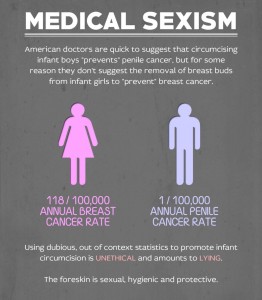
The circumcision industry promotes deliberate disinformation to alarm the general population into circumcising neonate boys
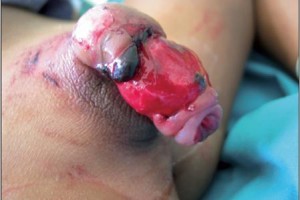
Botched circumcision resulted in the ‘death’ of this little boy’s penis…How will not having a penis, psychologically affect the rest of his life?
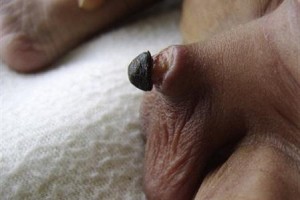
Botched ‘plastibell’ circumcision resulted in this atrocity. This is the necrotic glans just before it fell off. What are the physical and psychological consequences / aftermath of this tragedy to this little boy’s life ?
